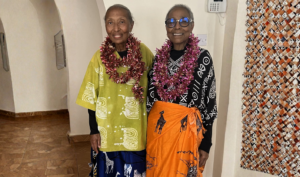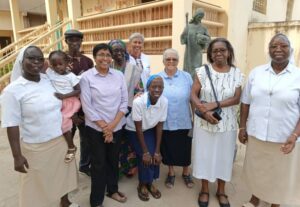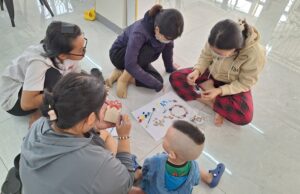Par Pascale Rizk, Agenzia Fides*
Chuncheon (Agence Fides) – Depuis plus de 50 ans, chaque jour que le bon Dieu nous accorde, à Chuncheon, Séoul et Jeju, les sœurs de Notre-Dame de la Charité du Bon Pasteur offrent en Corée du Sud leur travail et leurs prières aux femmes et aux jeunes filles en difficulté : mères célibataires, immigrées, femmes enceintes, jeunes filles maltraitées dans leur famille. Au cours des derniers mois, elles ont ont inauguré une nouvelle structure dédiée aux femmes à secourir dans leur maison provinciale de Chuncheon, le seul « bastion » d'une congrégation religieuse internationale présente dans la région.
Créée en 1995 grâce à des dons, la maison des sœurs de Chuncheon continue aujourd'hui encore de s'étendre avec le soutien de bienfaiteurs anciens et nouveaux, qui regardent avec estime le travail soutenu par les religieuses en faveur des femmes et des jeunes filles de tout le pays.
Lors de la cérémonie d'inauguration qui s'est déroulée en avril dernier, l'évêque de Chuncheon, Simone Kim Ju-young, s'est adressé aux bienfaiteurs en ces termes : ''Vous devez être les plus heureux de tous. Sachez que, même si nous, prêtres, manquons à la prière, les sœurs, au contraire, sont toujours assidues dans la prière." C'est lui-même qui, un an auparavant, avait invité les paroisses du diocèse à soutenir la collecte de fonds lancée par les sœurs pour mettre sur pied la nouvelle structure.
''Depuis 1993, '' raconte Sœur Marie Jean Bae, qui a été provinciale de 2014 à 2019. ''les sœurs de Chuncheon utilisaient gratuitement le terrain où se trouve la nouvelle structure. Puis, en 2022, le propriétaire a mis ce terrain en vente. S'il avait été vendu et qu'un autre bâtiment avait été construit sur le site, les sœurs auraient dû renoncer à leur projet.”
''Nous avons prié désespérément avec les sœurs de la branche contemplative. Dieu miséricordieux a entendu nos prières et, deux jours seulement après avoir intensifié nos prières, le propriétaire du terrain a changé d'avis et a décidé de le donner au couvent, s'excusant de ne pas l'avoir fait plus tôt.Le plus surprenant, c'est qu'il nous a même remerciées de l'avoir accepté. ''Lo más sorprendente es que incluso nos dio las gracias por aceptarlo,'' conclut Sœur Marie Jean, aujourd'hui coordinatrice en Corée du Sud de Talita kum, le réseau international de religieuses contre la traite des êtres humains.
Cette année, la Congrégation célèbre le bicentenaire de sa branche contemplative, dont l'histoire puise ses racines dans les œuvres et les intuitions spirituelles qui ont fleuri autour de la figure de saint Jean Eudes (1601-1680), au XVIIe siècleème à une époque où la prostitution était un fléau social puni par l'emprisonnement. Face à la misère et aux injustices perpétrées dans une période de déclin spirituel et moral, Eudes fut poussé par la jeune Madeleine Lamy à Caen, en Normandie, à créer le premier refuge, véritable ''hôpital pour ces âmes.”
Il s'écoula 150 ans entre l'approbation papale et la révolution de 1789, année où les religieux furent dispersés et leurs maisons fermées. Ce n'est qu'en 1825 que les maisons furent rouvertes grâce au courage d'une jeune supérieure, Marie-Euphrasie, fondatrice des Sœurs de Sainte-Madeleine, aujourd'hui Sœurs de Notre-Dame de la Charité du Bon Pasteur.
Religieuses aux côtés des femmes en situation difficile
C'est entre les années 60 et 70 du siècle dernier, juste après le Concile Vatican II, que des changements dans la vie des religieuses ont commencé à se faire sentir en Corée. En 1966, à l'invitation de Mgr Pierre Han Kong-ryel, évêque du diocèse de Gwangju, quatre sœurs américaines sont arrivées pour y faire fleurir la spiritualité des Sœurs du Bon Pasteur. Bouleversé par l'exploitation sexuelle des jeunes filles et des femmes par les militaires américains présents dans son diocèse, Han cherchait dans le charisme de la fondatrice Sainte Marie-Euphrasie l'esprit de compassion et de charité pour venir en aide à ces victimes d'abus.
C'est ainsi qu'en 1968, les sœurs ont créé un service d'accueil et une école professionnelle, situés près de la base aérienne américaine de Gunsan. Ce service a fonctionné jusqu'en 1976. Inspirées par la devise ''Une âme vaut plus qu' monde," la nécessité de soutenir les femmes seules enceintes a mis en évidence l'importance pour l'Église catholique de créer des structures adaptées à leurs besoins.
Ainsi, à l'invitation de l'évêque Park Thomas Stewart, les sœurs quittèrent leur première petite maison à Séoul pour ouvrir en 1979, dans la province de Chuncheon, la maison de Marie pour les mères célibataires, avant de déménager en 1985 dans le complexe actuel de la maison provinciale et dans les centres d'écoute et d'aide aux femmes.
Avec l'entrée en vigueur en Corée du Sud de la loi contre la prostitution de 2004 et l'augmentation significative des mariages internationaux - due principalement à l'établissement de relations diplomatiques avec la Chine en 1992 - les formes de soutien aux femmes en difficulté se sont amplifiées ; afin de répondre à l'urgence de fournir des conseils aux femmes victimes de violence domestique et d'améliorer la communication entre conjoints de nationalités différentes, souvent compliquée par les barrières linguistiques et culturelles.
Accueil pour guérir les blessures de l'âme et du corps
La sensibilisation accrue à la justice et à la dénonciation des abus subis par les femmes a conduit à la promulgation, en 1995, de la loi fondamentale pour le développement des femmes » (여성발전기본법). Dans les centres d'accueil pour femmes enceintes comme Mary's Home, les femmes sont préparées à un accouchement sûr, puis peuvent choisir de confier ou de garder leurs enfants. Le travail des sœurs est fondamental dans ce domaine, car elles promeuvent dans leur action des politiques contre l'avortement et en faveur de la dignité de la vie. En accueillant les femmes dans ces résidences, elles veulent également les protéger des préjugés sociaux.
Les mères victimes de différentes formes de violence peuvent également venir de l'extérieur pour chercher refuge dans les structures gérées par les sœurs, comme la Maison des amis » à Séoul ou un autre refuge à Jeju. Les formes de soutien peuvent être à court terme (6 mois) - renouvelables - ou à long terme (2 ans). Afin de les aider à retrouver une vie normale, des programmes sont conçus pour favoriser leur guérison physique et psychologique. Les femmes bénéficient d'un parcours de développement personnel et professionnel, ainsi que d'un soutien sous forme de nourriture et de logement gratuits, d'une assistance médicale, d'une formation professionnelle visant à l'indépendance économique et à la préparation au GED, un examen équivalent au baccalauréat traditionnel.
Un soutien juridique et investigatif particulier est assuré par le centre de Chuncheon, géré en collaboration avec Caritasqui offre des conseils juridiques, notamment pour citer en justice l'auteur du délit ou rédiger une déclaration dans le cadre d'une procédure civile. Il existe également des foyers pour accueillir les jeunes filles victimes de violence domestique et de problèmes familiaux. Dans Maison des amisIls reçoivent le soutien de leur famille.
Dans ces œuvres d'apostolat, comme la Maison des amis à Séoul, on s'efforce de redonner à ces jeunes filles la chaleur d'une famille, le sens de l'amour et de l'accueil dans un lieu sûret agréable qui tente de leur offrir un peu de normalité. ''Il n'y a pas de douleur plus grande que celle d'être maltraité à la maison par ses propres parents. Le chemin est long pour atteindre une indépendance saine et se rétablir sur le plan psycho-émotionnel, mais elles y parviennent», raconte Mariana Inea Young, thérapeute du « Jeu du sable » et assistante sociale. «Beaucoup reviennent pour partager leurs histoires de guérison», ajoute Sœur Damiana Ham.
Une ligne téléphonique pour l'aide à distance
Chaque jeudi, Sœur Rufina Hwa Jung Shim, âgée de 66 ans, aujourd'hui à la retraite après avoir passé 7 ans comme directrice du centre de la ligne d'assistance téléphonique à Jeju, se rendait dans les quartiers de la ville pour offrir son soutien aux femmes de la rue. Son zèle, quatrième vœu spécifique des sœurs du Bon Pasteur, lui permet de dépasser les limites de l'espace et du temps pour poursuivre sa mission. ''Chaque matin, nous commençons par une lecture de la Bible. Même si le personnel comprend des femmes de toutes les confessions présentes en Corée, l'Évangile reste au cœur de notre mission.”
At the 1366 Center, the sisters are commissioned by the diocese to manage the “Catholic Women’s Line” telephone counseling service, established in 1998 by the Ministry of Health and Welfare. Depending on the case, women are supported locally or placed in women’s shelters and connected with the police, hospitals, or other facilities established for their protection. In recent years, increased awareness of women’s issues in South Korea has led to a substantial change in government-sponsored social welfare services. Social service agencies working in the field are consulted by the government before defining the most appropriate policies. Appropriate professional qualifications are also required.
Le 1er juillet, le ministère de l'Égalité des chances et de la Famille a promulgué une loi selon laquelle le gouvernement mettra en place le système de paiement anticipé des allocations familiales. Esta normativa permite al Gobierno anticipar subsidios y contribuciones familiares incluso cuando uno de los progenitores, generalmente el padre, elude sus obligaciones de manutención de los hijos. Las cuotas no pagadas quedan como deuda que el progenitor insolvente debe saldar posteriormente con las instituciones públicas. La ley contempla el pago de una prestación mensual de 200.000 KRW (equivalentes a 125 euros) por cada hijo hasta que alcance la mayoría de edad, aliviando así las dificultades económicas de madres solteras y mujeres abandonadas por sus cónyuges.
*Cet article a été publié pour la première fois par Agenzia Fides le 3 juillet 2025 et est reproduit ici avec leur aimable autorisation. Accéder à l'article original ici.




